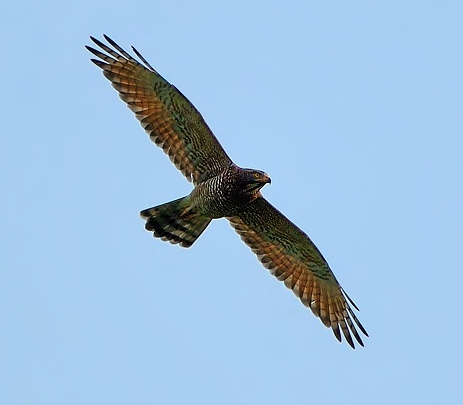Butastur indicus
 |
| Photo by Richard Yu (Formosa Birding) |
Common name:
grey-faced buzzard (en); bútio-de-faces-cinzentas (pt); busautour à joues grises (fr); busardo carigrís (es); kiefernteesa (de)
Taxonomy:
Order Falconiformes
Family Accipitridae
Range:
This species breeds in south-eastern Russia all the way to the Russian far east, in northern China, Korea and Japan. They migrate south to winter in southern and south-eastern China, Taiwan, through Indochina and the Malay Peninsula and into the Greater Sundas, Philippines, Sulawesi and the islands off north-western Borneo.
Size:
This medium-sized raptor is 41-47 cm long and has a wingspan of 100 cm. They weigh 400-450 g.
Habitat:
In their breeding range these birds are found in coniferous and mixed evergreen forests in mountains, at forest edges, fields, meadows, marshes, and around agricultural lands. They winter in open and semi-open woodlands.
Diet:
Grey-faced buzzards mostly hunt frogs, snakes, lizards, insects, crabs, small mammals and birds.
Breeding:
These birds breed in April-July. Both sexes help building the nest, a stick platform placed in a fork in a tree 8-17 m above the ground. There the female lays 3-4 white eggs with rusty spots, which she mostly incubates alone for 32-34 days while the male brings her food. The chicks are fed by both parents and fledge 35-40 days after hatching, but continue to receive food from their parents for another 1-2 weeks.
Conservation:
IUCN status – LC (Least Concern)
This species has a very large breeding range and a global population size estimated at 100.000 individuals. The population is suspected to be declining locally owing to ongoing persecution through shooting, but overall this species is not considered threatened at present.







